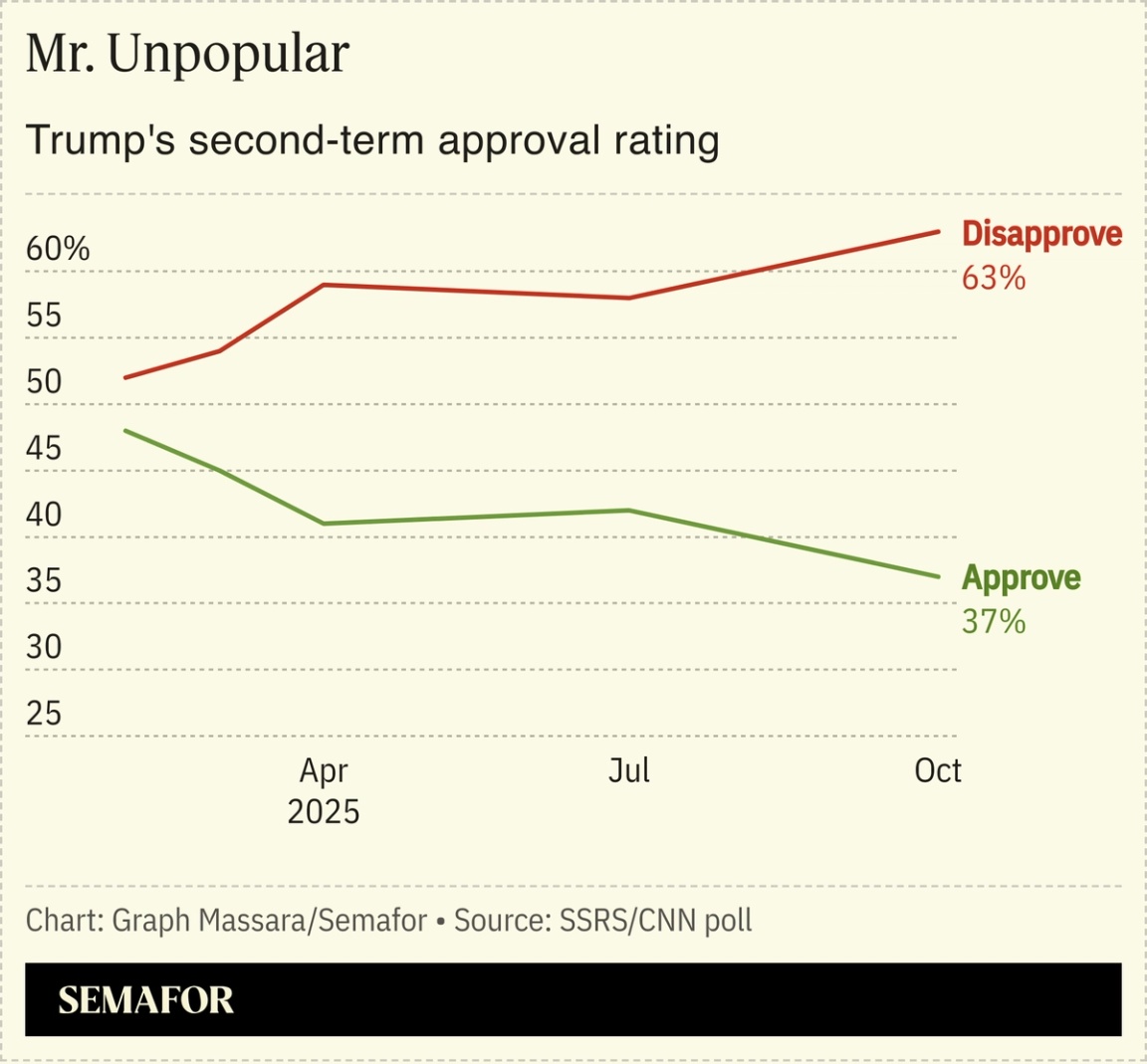| | In today’s edition: lessons from last night. ͏ ͏ ͏ ͏ ͏ ͏ |
| |   New York New York |   Richmond Richmond |   Trenton Trenton |
 | Americana |  |
| |
|
 - Blue clues
- The Republican cope
- Mr. Unpopular
- Mace’s airport diversion
- Least effective ad
- Most effective ad
|
|
| |  | David Weigel |
| |
 Jeenah Moon/Reuters Jeenah Moon/ReutersAfter ending his mayoral campaign with a walk across the Brooklyn Bridge, Zohran Mamdani got a question that no candidate can prepare for. “Any response to President Trump saying he’s better-looking than you?” Politico’s Timmy Facciola asked on Monday. Mamdani laughed and kept smiling. “My focus is on the cost-of-living crisis, bro,” he said. Thirty-six hours later, Mamdani became mayor-elect with more than 1 million votes — the first time that has happened since before the Beatles broke up. Democrats remain nervous about the implications of a Mamdani win for their lousy brand, and we still don’t know how Park Slope home-owner Chuck Schumer voted. But before Tuesday night, and a set of elections that went even better than Democrats had expected, Schumer’s party found a breezy answer for whether Mamdani helped or hurt them: He was focused on affordability, just like Abigail Spanberger in Virginia and Mikie Sherrill in New Jersey. They’ve quoted Eugene Debs less than Mamdani has, and they don’t want to slap handcuffs on Israel’s prime minister, but the trio have shared a focus on pocketbook issues. Last week, when I asked about Republican plans to tie every candidate to Mamdani (something the Senate GOP campaign apparatus tried to do before dawn on Wednesday), DNC chair Ken Martin told me: “If that’s where they want to focus their energy, we’re going to be focusing our energy on the fact that the Republicans and Donald Trump haven’t done anything to improve people’s lives.” In fact, as electric as Mamdani can be on the stump, he responded to a juicy question about confronting the president with a stock answer that supports this new Democratic depiction of his economic message: They could talk if Trump would “actually deliver on the campaign he ran to deliver cheaper groceries and a lower cost of living.” Sherrill and Spanberger were seen until 8 pm last night as cautious, sometimes dull campaigners who refused to follow the news cycle, but they did hammer a similar point. And they won by landslides. The scale of the GOP defeat — though it only shifts power in a couple of states — is already changing how both parties view the electorate. |
|
Republicans don’t sweat Tuesday |
 Alex Wong/Getty Images Alex Wong/Getty ImagesRepublicans are minimizing the damage from Tuesday’s elections, emphasizing that the biggest losses were in states the president lost last year and suggesting that voters would reward their agenda in 2026. “I think it’s idiotic to overreact to a couple of elections in blue states,” Vice President JD Vance wrote on X. “We inherited a disaster from Joe Biden and Rome wasn’t built in a day.” Republicans, he said, needed to do a better job turning out their new, lower-propensity coalition of voters — though in New Jersey, where Republicans were most optimistic about gaining ground this week, GOP turnout was up from four years ago. House Republicans predicted no backlash to their agenda and argued that the results were predictable. “Is it any surprise that, last night, blue states voted blue?” House Majority Leader Steve Scalise said at the party’s shutdown press conference on Wednesday. Republicans in the Virginia delegation were more concerned: All of them had rallied in Richmond last week, when Democrats started the process of changing the constitution to draw new maps and eliminate up to four of their five seats. Spinning away bad off-year election results is a bipartisan tradition. In 2009, the Obama White House said that defeat in Virginia and New Jersey came down to weak candidates and frustration about the economy, highlighting a House special election win for Democrats. Eight years ago, the last time Democrats swept Virginia and New Jersey, Trump said it was on Republicans that they didn’t embrace him and his movement — not an issue for GOP candidates this year. Republicans got a shred of good news later Wednesday in Maine, with the retirement announcement of Democratic Rep. Jared Golden, who’s been able to repeatedly win in a pro-Trump district. |
|
 Ken Burns has been telling the story of America through his entire career with genre-defining documentaries on the Civil War, the Vietnam War, and now the American Revolution. This week, Ben and Max bring on the renowned documentarian to talk about his latest series, the parallels he sees between America’s founding moment and today’s media environment, and what we can learn from our history. They also discuss what he makes of the Trump administration’s cuts on PBS, and – after spending 10 meticulous years making a 12-hour documentary – his take on short form video and talk podcasts like this one. |
|
Trump’s sinking approval underpins Democratic victories |
 Most pollsters in Virginia and New Jersey underrated the strength of the Democratic tickets this year. The memories of pollsters missing “shy” Trump voters and Republican overperformance in elections four years ago are fresh, and Democrats are in a popularity crisis. That crisis hasn’t abated: Just 29% of voters say they view the party favorably, compared to 33% who view the GOP favorably. But those same voters are sour on Donald Trump, and 61% say his policies have “worsened” economic conditions; 45% said that of Joe Biden about four years ago. The elections might have disabused Democrats — and some Republicans — of the notion that the president defies gravity and that reporters and pollsters can’t see how deep his support runs. |
|
Mace’s airport episode roils S.C. race |
 Evelyn Hockstein/Reuters Evelyn Hockstein/ReutersFor days, GOP Rep. Nancy Mace’s campaign for governor of South Carolina has focused on an unexpected issue: whether airport security treated her fairly. She threatened to sue Charleston airport employees over how they handled her requests before a recent flight and accused them of “falsifying” an embarrassing police report about the episode. The report on the Oct. 30 incident, shared widely by local media outlets, claimed that Mace had cursed at security escorts and tried to use a crew entrance. Over days, and dozens of social media posts, Mace insisted that the incident report was wrong. If elected governor, she said, “I will fire people for being incompetent. I will fire people for being lazy. I will fire people for being corrupt.” Mace even tangled with the state’s two Republican senators, Lindsey Graham and Tim Scott, after they came to the airport employees’ defense. So did one of her opponents in the primary, state Attorney General Alan Wilson, who shared images of his own visit to the airport to thank “our law enforcement and security teams” for working during a government shutdown. Her many enemies in state GOP politics joined in, with strategist Wes Donohue releasing a pro-airport security letter from local leaders and asking whether her trip (to Las Vegas for the Republican Jewish Coalition meeting) justified security that’s usually given for official business. |
|
Earle-Sears’ message misfire on gender identity |
 Winsome Earle-Sears/YouTube Winsome Earle-Sears/YouTubeWe’ll be chewing over the Tuesday results for a while, talking to strategists and learning from post-election analysis. But it’s not too soon to judge what didn’t work: Republican ads about trans rights and inclusive gender identity policies in schools. Most of Winsome Earle-Sears’ spending as the party’s Virginia gubernatorial nominee focused on that issue, and many of those ads used a lurid news story to personalize it — the arrest of a sex offender for alleged indecent exposure and other charges inside a school’s female locker room. And then there was this spot, Now. A stopwatch ticks as a narrator warns that “they hate your guts” and that “lunatics” are “wish[ing] death” on their enemies. It was a misread of what the electorate cared about, with a tone that disregarded the mood of swing voters. |
|
A standout series in Pennsylvania’s court race |
 Vote Yes for Fair and Independent Courts/YouTube Vote Yes for Fair and Independent Courts/YouTubePennsylvania Democrats faced a challenge: how to get off-year voters to show up (or check their mail), flip their ballots over, and vote to retain three liberal state Supreme Court justices. Republicans beat them to the mailboxes and airwaves with ads that portrayed the justices as anti-democratic, telling GOP voters that they practiced the sort of “lawfare” that has haunted Trump. The Democratic response was to humanize the justices with a series of spots where they spoke straight to camera and talked about their work in populist terms: “We hold big corporations accountable.” That highlighted the choice on Tuesday, between three named justices and three empty seats — and it was effective. |
|
 Alexandria Ocasio-Cortez at Zohran Mamdani’s watch party. Shannon Stapleton/Reuters Alexandria Ocasio-Cortez at Zohran Mamdani’s watch party. Shannon Stapleton/ReutersIt’s too early to talk about 2028, and I’m not a big fan of blind quotes. But Ben Terris’ unsentimental look in New York Magazine at how Democrats see their most obviously ambitious potential candidates is so fun that I dropped all my prejudices. The line about Rep. Alexandria Ocasio-Cortez, D-N.Y., having a progressive lane to herself as “white moderate-coded men” crowd the rest of the field didn’t land with me, but it doesn’t need to. This is a very direct look at what the Democrats who’ll be asked to chair fundraisers or organize get-out-the-vote shifts think of their options. |
|
I spent last weekend in New Jersey and New York City, not Las Vegas, so I missed an unexpectedly eventful Republican Jewish Coalition meeting. It did feature a lot of New York and Mamdani talk, as expected. But it came right after Tucker Carlson’s now-notorious interview with Nick Fuentes, and right as Heritage Foundation chief Kevin Roberts defended Carlson’s relationship with the think tank. Politico’s Samuel Benson and Jewish Insider’s Matthew Kassell had my favorite reporting from inside the Venetian. |
|
|